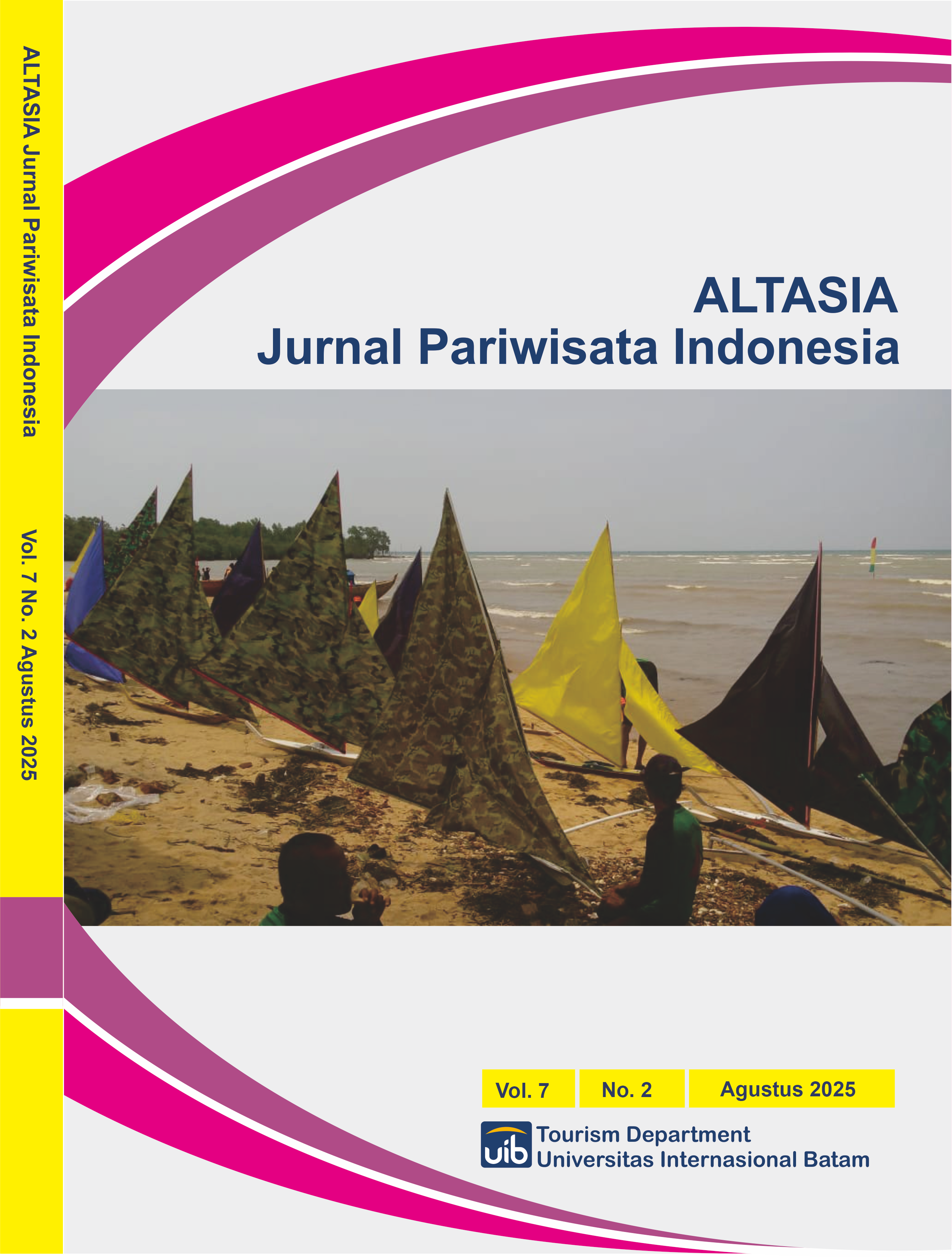Meningkatkan Kualitas Pendidikan Pariwisata dengan Design Thinking: Sebuah Tinjauan Literatur Sistematis tentang Efikasi Diri
Sebuah Tinjauan Literatur Sistematis tentang Efikasi Diri
DOI:
https://doi.org/10.37253/altasia.v7i2.9888Keywords:
design thinking, self-efficacy, innovation, higher education, systematic literature reviewAbstract
Studi ini mengeksplorasi dampak intervensi Design Thinking (DT) terhadap efikasi diri di kalangan mahasiswa melalui tinjauan literatur sistematis (SLR). Kerangka kerja PRISMA membimbing proses tinjauan, dengan pencarian sistematis di database Scopus, Web of Science, dan Emerald Insight. Literatur dari tahun 2014 hingga 2023 disaring berdasarkan kata kunci yang terkait dengan mahasiswa, DT, dan efikasi diri. Studi dipilih berdasarkan relevansi. Penilaian kualitas dilakukan menggunakan Mixed Method Appraisal Tool (MMAT). Analisis menggunakan analisa tematik untuk mengidentifikasi tema. Kategori efikasi diri ditemukan dalam beberapa bentuk: efikasi diri umum, kreatif, kewirausahaan, inovasi, desain, dan teknik. Intervensi DT menunjukkan hasil yang beragam dalam meningkatkan efikasi diri umum, dampak yang tidak konsisten pada efikasi diri kreatif, peningkatan efikasi diri kewirausahaan, mempertahankan efikasi diri inovasi yang sudah tinggi, peningkatan yang terarah pada efikasi diri dalam desain, dan peningkatan efikasi diri teknik. DT memiliki dampak yang bervariasi pada efikasi diri di berbagai tema, dengan manfaat yang signifikan dalam konteks kewirausahaan dan inovasi. Dalam bidang pariwisata dan perhotelan, mengintegrasikan DT ke dalam kurikulum dapat meningkatkan penyampaian layanan, inovasi, dan efisiensi operasional. Penelitian di masa depan harus fokus pada efek jangka panjang DT dalam industri ini, mengatasi tantangan nyata dan keberlanjutan. Pendekatan ini mempersiapkan pemimpin masa depan untuk menghadapi tantangan kompleks dan mendorong solusi inovatif dalam pariwisata dan perhotelan.
Downloads
References
Abdo, S. M. (2023). Design Thinking in Open and Distance Learning. International Journal of Management and Applied Research. https://api.semanticscholar.org/CorpusID:264577612
Artino Jr., A. R. (2012). Academic self-efficacy: From educational theory to instructional practice. Perspectives on Medical Education, 1(2), 76–85. https://doi.org/10.1007/S40037-012-0012-5
Bandura, A. (1997). Self-efficacy: The exercise of control. (pp. ix, 604). W H Freeman/Times Books/ Henry Holt & Co.
Bhushan, S. (2019). Design thinking in hospitality education and research. Worldwide Hospitality and Tourism Themes. https://api.semanticscholar.org/CorpusID:213507651
Breen, K. C., Dotson, M. E., Madonna, M. C., Asturias, G., Peña, D. M., Springate, H., Alvarez, V., & Ramanujam, N. (2023). Community-Centered Design Thinking as a Scalable Stem Learning Intervention. Advances in Engineering Education, 11(2), 2–33. Scopus. https://doi.org/10.18260/3-1-1153-36042
Bringardner, J., Castroverde, E., Charette, P., Abuelgasim, M. S. M. S., Yoshinobu, M., Li, R., Bill, V., & Paredes, I. (2023). The Impact of Documenting Design Thinking, the Engineering Design Process Canvas, and Project Communication on Design Self-Efficacy of First-Year Students. ASEE Annu. Conf. Expos. Conf. Proc. ASEE Annual Conference and Exposition, Conference Proceedings. Scopus. https://www.scopus.com/inward/record.uri?eid=2-s2.0-85172120726&partnerID=40&md5=251a1569af57c3f9ad2ddb31f250b192
Butler, A. G., & Roberto, M. A. (2018). When Cognition Interferes with Innovation: Overcoming Cognitive Obstacles to Design Thinking. Research-Technology Management, 61(4), 45–51. https://doi.org/10.1080/08956308.2018.1471276
Charosky, G., & Bragos, R. (2021). Investigating students’ self-perception of innovation competences in challenge-based and product development courses. International Journal of Engineering Education, 37(2), 461–470. Scopus.
Chen, M.-H., Cheng, S.-P., & Wu, L. Y. (2023). Merging Design Thinking into Translational Research in a Biomedical Engineering Laboratory (DT-TRBEL) Course. Sustainability (Switzerland), 15(18). Scopus. https://doi.org/10.3390/su151813688
Christensen, B. T., Arendt, K. M., McElheron, P., & Ball, L. J. (2023). The design entrepreneur: How adaptive cognition and formal design training create entrepreneurial self-efficacy and entrepreneurial intention. Design Studies, 86, 101181. https://doi.org/10.1016/j.destud.2023.101181
Christoforakos, L., Tretter, S., Diefenbach, S., Bibi, S.-A., Fröhner, M., Kohler, K., Madden, D., Marx, T., Pfeiffer, T., Pfeiffer-Leßmann, N., & Valkanova, N. (2019). Potential and Challenges of Prototyping in Product Development and Innovation: Insights from an Expert Discussion Among Researchers and Practitioners. I-Com, 18(2), 179–187. https://doi.org/10.1515/icom-2019-0010
CONSULTING.COM.AU, C., Panca, T., & Panca, I. (2020). Self-Efficacy in Human Agency. https://api.semanticscholar.org/CorpusID:251445342
Cruz, S., Vieira, C., & Bidarra, J. (2023). Digital Art, Sustainability and Design Thinking: Study of a Case in Higher Education. In Zervas E. (Ed.), E3S Web Conf. (Vol. 436). EDP Sciences; Scopus. https://doi.org/10.1051/e3sconf/202343606004
Cruzes, D. S., & Dyba, T. (2011). Recommended Steps for Thematic Synthesis in Software Engineering. 2011 International Symposium on Empirical Software Engineering and Measurement, 275–284. https://doi.org/10.1109/ESEM.2011.36
Daniel, A. D. (2016). Fostering an entrepreneurial mindset by using a design thinking approach in entrepreneurship education. Industry and Higher Education, 30(3), 215–223. Scopus. https://doi.org/10.1177/0950422216653195
Daniel, A. D., Costa, R. A., Pita, M., & Costa, C. (2017). Tourism Education: What about entrepreneurial skills? Journal of Hospitality and Tourism Management, 30, 65–72.
Deale, C. S. (2016). Entrepreneurship education in hospitality and tourism: Insights from entrepreneurs. Journal of Teaching in Travel & Tourism, 16, 20–39.
Díaz-Pareja, E. M., Llorent-Vaquero, M., Cámara-Estrella, Á. M., & Ortega-Tudela, J. M. (2021). Sustainable education: Using social networks in education for change. Sustainability (Switzerland), 13(18). Scopus. https://doi.org/10.3390/su131810368
Do Amaral, J. A. A., & Gamez, L. (2023). Exploring the synergistic effects of combining design thinking and project-based learning in a blended course. Journal of Applied Learning and Teaching, 6(2), 260–270. Scopus. https://doi.org/10.37074/jalt.2023.6.2.21
Eisenbart, B., Bouwman, S., Voorendt, J., McKillagan, S., Kuys, B., & Ranscombe, C. (2022). Implementing design thinking to drive innovation in technical design. International Journal of Design Creativity and Innovation, 10(3), 141–160. https://doi.org/10.1080/21650349.2022.2048698
Ellermann, L. (2017). University of Ljubljana: Applying the Design-Thinking Approach to Entrepreneurship Education. In Int. Stud. Entrep. (Vol. 37, pp. 229–258). Springer; Scopus. https://doi.org/10.1007/978-3-319-55547-8_9
Font, X., English, R., & Gkritzali, A. (2018). Mainstreaming sustainable tourism with user-centred design. Journal of Sustainable Tourism, 26, 1651–1667.
Fotaris, P., & Mastoras, T. (2022). Room2Educ8: A Framework for Creating Educational Escape Rooms Based on Design Thinking Principles. Education Sciences, 12(11). Scopus. https://doi.org/10.3390/educsci12110768
Grzegorz, Z., & Malwina, S. (2015). Application of design-thinking models to improve the quality of tourism service. https://api.semanticscholar.org/CorpusID:204142883
Hadar, L. L., Ergas, O., Alpert, B. R., & Ariav, T. (2020). Rethinking teacher education in a VUCA world: Student teachers’ social-emotional competencies during the Covid-19 crisis. European Journal of Teacher Education, 43, 573–586.
Hong, Q. N., Fàbregues, S., Bartlett, G., Boardman, F., Cargo, M., Dagenais, P., Gagnon, M.-P., Griffiths, F., Nicolau, B., O’Cathain, A., Rousseau, M.-C., Vedel, I., & Pluye, P. (2018). The Mixed Methods Appraisal Tool (MMAT) version 2018 for information professionals and researchers. Education for Information, 34(4), 285–291. https://doi.org/10.3233/EFI-180221
Jackson, A., Mentzer, N., Laux, D., Sears, D., & Asunda, P. (2016). Student Self-Perceptions of Design and Creative Thinking (Fundamental). 2016 ASEE Annual Conference & Exposition Proceedings, 25927. https://doi.org/10.18260/p.25927
Kiger, M. E., & Varpio, L. (2020). Thematic analysis of qualitative data: AMEE Guide No. 131. Medical Teacher, 42(8), 846–854. https://doi.org/10.1080/0142159X.2020.1755030
Kleber, D. M.-S. (2018). Design Thinking for Creating an Increased Value Proposition to Improve Customer Experience. ETIKONOMI. https://api.semanticscholar.org/CorpusID:158507658
Kuo, H.-C., Tseng, Y.-C., & Yang, Y.-T. C. (2019). Promoting college student’s learning motivation and creativity through a STEM interdisciplinary PBL human-computer interaction system design and development course. Thinking Skills and Creativity, 31, 1–10. Scopus. https://doi.org/10.1016/j.tsc.2018.09.001
Lake, D., Ricco, M. E., & Whipps, J. (2016). Design thinking accelerated leadership: Transforming self, transforming community. Journal of General Education, 65(3–4), 159–177. Scopus. https://doi.org/10.5325/jgeneeduc.65.3-4.0159
Levy, M. (2017). Design thinking in multidisciplinary learning teams: Insights from multidisciplinary teaching events. In Metzger A. & Persson A. (Eds.), Lect. Notes Bus. Inf. Process. (Vol. 286, pp. 101–109). Springer Verlag; Scopus. https://doi.org/10.1007/978-3-319-60048-2_10
Lewis, E. J., Ludwig, P. M., Nagel, J., & Ames, A. (2019). Student ethical reasoning confidence pre/post an innovative makerspace course: A survey of ethical reasoning. Nurse Education Today, 75, 75–79. Scopus. https://doi.org/10.1016/j.nedt.2019.01.011
Lewrick, M., Thommen, J.-P., & Leifer, L. (2020). The Design Thinking Life Playbook: Empower Yourself, Embrace Change and Visualize a Joyful Life. John Willey & Sons, Inc.
Lin, Q., Sun, Y., & Liu, Z. (2023). Strategies to improve the student engagement of Vocational College class based on design thinking. Ergonomics In Design. https://api.semanticscholar.org/CorpusID:259711080
Liu, H.-Y. (2023). Design thinking competence as self-perceived by nursing students in Taiwan: A cross-sectional study. Nurse Education Today, 121. Scopus. https://doi.org/10.1016/j.nedt.2022.105696
Lockwood, C., Munn, Z., & Porritt, K. (2015). Qualitative research synthesis: Methodological guidance for systematic reviewers utilizing meta-aggregation. JBI Evidence Implementation, 13(3). https://journals.lww.com/ijebh/fulltext/2015/09000/qualitative_research_synthesis__methodological.10.aspx
Lugo, J. E., Zapata-Ramos, M. L., & Perez-Vargas, M. J. (2016). Promotion of innovation and entrepreneurship in engineering design by synchronizing engineering and business school courses. Proc. ASME Des. Eng. Tech. Conf., 3. Scopus. https://doi.org/10.1115/DETC2016-59701
Luna, A., Talavera, A., & Chong, M. (2018). How to motivate the interest in physics to engineering students without dying in the attempt? In Ciampi M.M. & da Rocha Brito C. (Eds.), EDUNINE - IEEE World Eng. Educ. Conf.: Role Prof. Assoc. Contemp. Eng. Careers, Proc. Institute of Electrical and Electronics Engineers Inc.; Scopus. https://doi.org/10.1109/EDUNINE.2018.8450949
Macagno, T., Nguyen-Quoc, A., & Jarvis, S. P. (2024). Nurturing Sustainability Changemakers through Transformative Learning Using Design Thinking: Evidence from an Exploratory Qualitative Study. Sustainability (Switzerland), 16(3). Scopus. https://doi.org/10.3390/su16031243
Maddux, J. E., & Kleiman, E. M. (2016). Self-Efficacy. In The Wiley Handbook of Positive Clinical Psychology (pp. 89–101). John Wiley & Sons, Ltd. https://doi.org/10.1002/9781118468197.ch7
Meinel, C., & Krohn, T. (Eds.). (2022). Design Thinking in Education: Innovation Can Be Learned. Springer International Publishing. https://doi.org/10.1007/978-3-030-89113-8
Menold, J., Jablokow, K. W., Simpson, T. W., & Waterman, E. A. (2016). The Prototype for X (PFX) framework: Assessing its impact on students’ prototyping awareness. ASEE Annu. Conf. Expos. Conf. Proc., 2016-June. Scopus. https://www.scopus.com/inward/record.uri?eid=2-s2.0-84983273909&partnerID=40&md5=2f737cd745648594ffa6d642ffec281b
Mentzer, N., Krishna, B., Kotangale, A., & Mohandas, L. (2023). HyFlex environment: Addressing students’ basic psychological needs. Learning Environments Research, 26(1), 271–289. Scopus. https://doi.org/10.1007/s10984-022-09431-z
Molinari, A., & Gasparini, A. A. (2019). When Students Design University: A Case Study of Creative Interdisciplinarity between Design Thinking and Humanities. Open Education Studies, 1(1), 24–52. Scopus. https://doi.org/10.1515/edu-2019-0002
Ohly, S., Plückthun, L., & Kissel, D. (2017). Developing students’ creative self-efficacy based on design-thinking: Evaluation of an elective university course. Psychology Learning and Teaching, 16(1), Article 1. Scopus. https://doi.org/10.1177/1475725716681714
Page, M. J., McKenzie, J. E., Bossuyt, P. M., Boutron, I., Hoffmann, T. C., Mulrow, C. D., Shamseer, L., Tetzlaff, J. M., Akl, E. A., Brennan, S. E., Chou, R., Glanville, J., Grimshaw, J. M., Hróbjartsson, A., Lalu, M. M., Li, T., Loder, E. W., Mayo-Wilson, E., McDonald, S., … Moher, D. (2021). The PRISMA 2020 statement: An updated guideline for reporting systematic reviews. Systematic Reviews, 10(1), 89. https://doi.org/10.1186/s13643-021-01626-4
Palacin-Silva, M., Khakurel, J., Happonen, A., Hynninen, T., & Porras, J. (2017). Infusing Design Thinking into a Software Engineering Capstone Course. In Washizaki H. & Mead N. (Eds.), Proc. - IEEE Conf. Softw. Eng. Educ. Train., CSEE T (Vols. 2017-January, pp. 212–221). Institute of Electrical and Electronics Engineers Inc.; Scopus. https://doi.org/10.1109/CSEET.2017.41
Panke, S. (2019). Design Thinking in Education: Perspectives, Opportunities and Challenges. 1(1), 281–306. https://doi.org/10.1515/edu-2019-0022
Patil, P. A., Patil, S. K., Department of Mechanical Engineering, Rajarambapu Institute of Technology, Shivaji University, Sakharale, MS-415414, India., Kulkarni, S. S., & Department of Civil Engineering, Rajarambapu Institute of Technology, Shivaji University, Sakharale, MS-415414, India. (2023). Inculcating Design Thinking Methodology in the Minds of First Year Engineering Students: A Step Towards Entrepreneurial Thinking. Journal of Engineering Education Transformations, 36(S2), 283–291. https://doi.org/10.16920/jeet/2023/v36is2/23041
Revano, T. F., & Garcia, M. B. (2020). Manufacturing Design Thinkers in Higher Education Institutions: The Use of Design Thinking Curriculum in the Education Landscape. 2020 IEEE 12th International Conference on Humanoid, Nanotechnology, Information Technology, Communication and Control, Environment, and Management (HNICEM), 1–5.
Risku, J., Kemell, K.-K., Kultanen, J., Feschenko, P., Carelse, J., & Korpikoski, K. (2019). Does Self-efficacy Matter? On the Correlation of Self-efficacy and Creativity in IT Education. International Conference on Software Business. https://api.semanticscholar.org/CorpusID:207943349
Sandorova, Z., & Betak, N. (2022). Implementing Design Thinking and Peer Instruction in an Online Environment to Develop Tourism Undergraduates’ English Language Skills. JOURNAL OF LANGUAGE AND CULTURAL EDUCATION, 10(2), 20–41. https://doi.org/10.2478/jolace-2022-0008
Sándorová, Z., Repáňová, T., Palenvcíková, Z., & Beták, N. (2020). Design thinking—A revolutionary new approach in tourism education? Journal of Hospitality, Leisure, Sport & Tourism Education. https://api.semanticscholar.org/CorpusID:212902127
Sarooghi, H., Sunny, S., Hornsby, J., & Fernhaber, S. (2019). Design Thinking and Entrepreneurship Education: Where Are We, and What Are the Possibilities? Journal of Small Business Management, 57(sup1), 78–93. https://doi.org/10.1111/jsbm.12541
Snyder, K. M., Ingelsson, P., & Bäckström, I. (2018). Using design thinking to support value-based leadership for sustainable quality development. Bus. Process. Manag. J., 24, 1289–1301.
Stolz, R. C., Blackmon, A. T., Engerman, K., Tonge, L., & McKayle, C. A. (2022). Poised for creativity: Benefits of exposing undergraduate students to creative problem-solving to moderate change in creative self-efficacy and academic achievement. Journal of Creativity, 32(2), 100024. https://doi.org/10.1016/j.yjoc.2022.100024
Sutadi, A. S. (2022). The Effect of Design Thinking Method Toward the Motivation of Visual Communication Design Students in Becoming an Entrepreneur. Journal of Visual Communication Design. https://api.semanticscholar.org/CorpusID:245941133
Tran, K. N., Kudrowitz, B., & Koutstaal, W. (2022). Fostering creative minds: What predicts and boosts design competence in the classroom? International Journal of Technology and Design Education, 32(1), 585–616. Scopus. https://doi.org/10.1007/s10798-020-09598-7
Tsalapatas, H., Heidmann, O., Pata, K., Vaz De Carvalho, C., Bauters, M., Papadopoulos, S., Katsimendes, C., Taka, C., & Houstis, E. (2019). Teaching Design Thinking through Gamified Learning: Proceedings of the 11th International Conference on Computer Supported Education, 278–283. https://doi.org/10.5220/0007697402780283
Tu, J.-C., Liu, L.-X., & Wu, K.-Y. (2018). Study on the learning effectiveness of stanford design thinking in integrated design education. Sustainability (Switzerland), 10(8). Scopus. https://doi.org/10.3390/su10082649
Ulibarri, N., Cravens, A. E., Cornelius, M., Royalty, A., & Nabergoj, A. S. (2014). Research as design: Developing creative confidence in doctoral students through design thinking. International Journal of Doctoral Studies, 9, 249–270. Scopus. https://doi.org/10.28945/2062
Val, E., Gonzalez, I., Lauroba, N., & Beitia, A. (2019). How can Design Thinking promote entrepreneurship in young people? The Design Journal, 22, 111–121.
Victorino, G., Coelho, P. S., & Henriques, R. (2023). The Value of Design Thinking for PhD Students: A Retrospective Longitudinal Study. Emerging Science Journal, 7, 16–31. Scopus. https://doi.org/10.28991/ESJ-2023-SIED2-02
Vignoli, M., Dosi, C., & Balboni, B. (2023). Design thinking mindset: Scale development and validation. Studies in Higher Education, 48(6), 926–940. Scopus. https://doi.org/10.1080/03075079.2023.2172566
Wang, M. S., Munoz, K. E., & Tham, A. (2022). Enhancing industry-ready competence and skills through design thinking integration: Evidence from a CLIL-based hospitality course. Consumer Behavior in Tourism and Hospitality, 17(3), 326–337. https://doi.org/10.1108/CBTH-09-2021-0211
Watson, A. D. (2015). Design Thinking for Life. Art Education, 68, 12–18.
Withell, A., & Haigh, N. (2013). Developing design thinking expertise in higher education. https://api.semanticscholar.org/CorpusID:153728641
Wong, D. J., Miranda-Nieves, D., Nandivada, P., Patel, M. S., Hashimoto, D. A., Kent, D. O., Gómez-Márquez, J., Lin, S. J., Feldman, H. J., & Chaikof, E. L. (2021). The Surgical Program in Innovation (SPIN): A Design and Prototyping Curriculum for Surgical Trainees. Academic Medicine, 96(9), 1306–1310. Scopus. https://doi.org/10.1097/ACM.0000000000003958
Yang, C.-M., & Hsu, T.-F. (2020). Integrating Design Thinking into a Packaging Design Course to Improve Students’ Creative Self-Efficacy and Flow Experience. Sustainability, 12(15), 5929. https://doi.org/10.3390/su12155929
Zach, F. J., & Krizaj, D. (2017). Experiences Through Design and Innovation Along Touch Points. https://api.semanticscholar.org/CorpusID:113682058
Zajdel, T. J., & Maharbiz, M. M. (2016). Teaching design with a tinkering-driven robot hack. Proc. Front. Educ. Conf. FIE, 2016-November. Scopus. https://doi.org/10.1109/FIE.2016.7757484
Zancul, E. D. S., Dos S Durão, L. F. C., De Deus Lopes, R., Nakano, D., Blikstein, P., Majzoub, G. G., & Dalmon, D. L. (2017). An empirical study on design-based vs. Traditional approaches in capstone courses in engineering education. Int. J. Eng. Educ., 33(5), 1543–1560. Scopus. https://www.scopus.com/inward/record.uri?eid=2-s2.0-85028602713&partnerID=40&md5=8ac59b1d61dd4f3b6484221e1a121f21
Zaqoot, W., & Oh, L.-B. (2018). Teaching design thinking using online whiteboarding in a graduate-level digital innovation course. In Rodrigo M.M.T., Yang J.-C., Wong L.-H., & Chang M. (Eds.), ICCE - Int. Conf. Comput. Educ., Main Conf. Proc. (pp. 573–582). Asia-Pacific Society for Computers in Education; Scopus. https://www.scopus.com/inward/record.uri?eid=2-s2.0-85060023112&partnerID=40&md5=4c8e0f2639c17106c7f4cb0632e4e398
Zarazaga, J. M. (2018). Mapping as design thinking: Can GIS help engineering students approach design? ASEE Annu. Conf. Expos. Conf. Proc., 2018-June. Scopus. https://www.scopus.com/inward/record.uri?eid=2-s2.0-85051177536&partnerID=40&md5=e892a123b24c63146ccc3ad6d9465d91
Zimmerman, B. J. (2000). Self-Efficacy: An Essential Motive to Learn. Contemporary Educational Psychology, 25(1), 82–91. https://doi.org/10.1006/ceps.1999.1016
Downloads
Published
Issue
Section
License
Copyright (c) 2025 Altasia Jurnal Pariwisata Indonesia

This work is licensed under a Creative Commons Attribution-NonCommercial 4.0 International License.
The article publication is wholly owned by the Indonesian Tourism Journal (ALTASIA).






.png)





